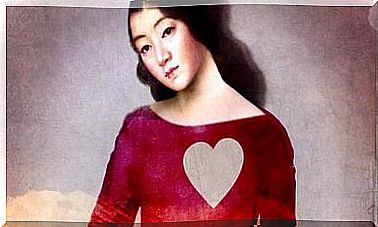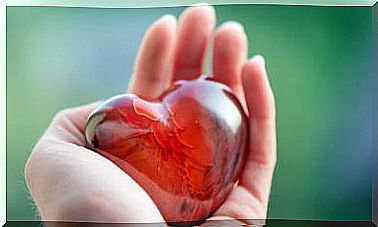What Is The Most Important Ingredient For A Happy Life?

Science has offered a host of answers to this question, especially over the past five decades. Some say wealth, some say religion, and others say family is the most important thing.
But, there is a factor that is repeated with some constancy and that generates a great controversy: the influence of our childhood on the adult development that we have had. Thus, in our first years of life we acquire a way of seeing the world that later we will not be able to easily banish or replace. On the other hand, this way of seeing the world is going to be influenced by an essential factor. Can you imagine what it is?
That factor is bonding, warmth, and attention. In a word, love.
Love, the most important thing to have a happy life
This factor was recently studied in a very specific way by Harvard researchers (Vaillant, 2012). Their goal was to compare the effects of childhood financial wealth with childhood warmth. By following more than 200 men (yes, only men) for more than 70 years. In this follow-up, they came to some interesting conclusions.
They appreciated that financial wealth in childhood has little to do with adult success, satisfaction, and adjustment. Parental warmth and care throughout childhood is a much more powerful positive predictor .
Some may wonder, “What is the problem that in some cases love is lacking? Don’t all parents love their children innately? “
Love, children and happy life
Beyond feeling loved, a child has to feel recognized by his parents. A child has to feel that his parents know and love him as he is: with his strengths and weaknesses, personality traits, preferences, weaknesses and quirks. You must feel that your parents really see and know you.
That is the only kind of love that is truly and genuinely felt. It is the only kind of love that produces a child with healthy self-esteem, a strong sense of identity, and resilient self-worth.
A question you can often ask yourself is: “When you grew up, did you know that your parents loved you? Or do you think your parents loved you? It is a vital distinction. Because you can know that someone loves you without actually feeling it.
Happy life is both giving and receiving
For example, if in addition to ensuring some basic rights – education, clothing, food and shelter – they talked to you, cared about you, asked what you felt or motivated you, your parents really loved you and knew you.
If the latter in your childhood was like this, then you probably have a good foundation for success in your life. You probably know yourself, you have your own preferences, weaknesses, weaknesses and strengths.
If, on the contrary, it was not like that, then it is possible that you still have not received some positive things from your childhood. Often we look back and do not know how to connect our past very well with our present and with what we hope for in the future.
Let’s reflect on whether we are doing well
Doing this work of introspection well can help us, not only to integrate what stops us, but also to identify disguised or hidden elements that we have not seen until now.
Why is love so important in early childhood? There are many reasons. Perhaps the first and most important is that it constitutes the birth of confidence, both in oneself and in others. We are talking about blind trust, the kind that you can place without having to watch your back.
Another no less important is the one that has to do with learning. Who received a healthy love learned to give and express a healthy love. In addition, those who developed this type of attachment could see with their own eyes the effects of generosity, dedication and unconditional support.
Who received love, enjoyed his childhood. He could have more or less toys, he could go to a more or less exclusive school but surely he was happy and on countless occasions he could feel that he had everything, despite not having stopped wanting or wanting the trinket that was rarely bought for him .
Finally, what is happiness if it is not love and love, if it is not happiness?
What we can say is that a full childhood does not guarantee our success as adults, just as a childhood with abuse and sadness does not guarantee failure. What is certain is that people who received love in their childhood and felt protected and loved have a very important advantage when entering the adult world.
That said, as adults we are responsible for our children, but also for all children who play or cry today. As a society and as humanity we must be aware that what we sow in them today will probably guide their lives tomorrow.









